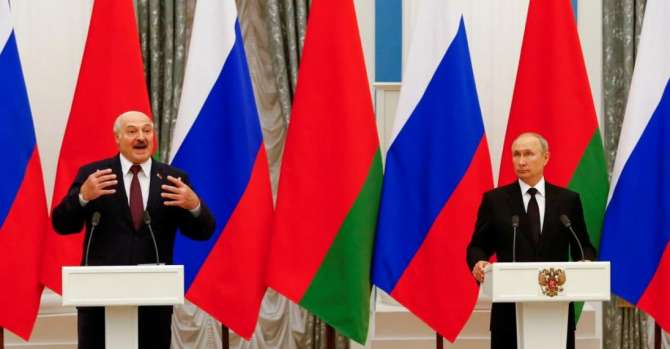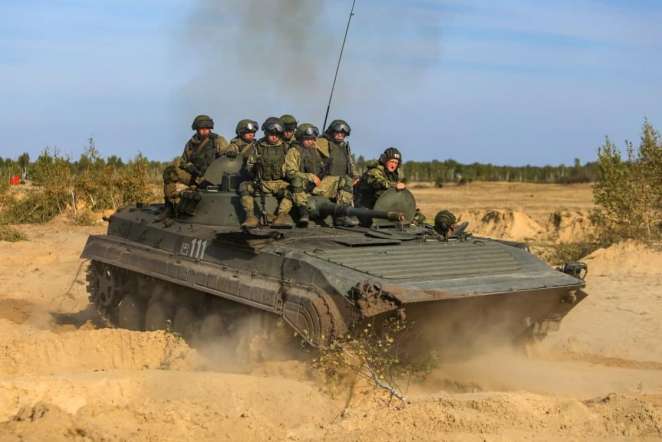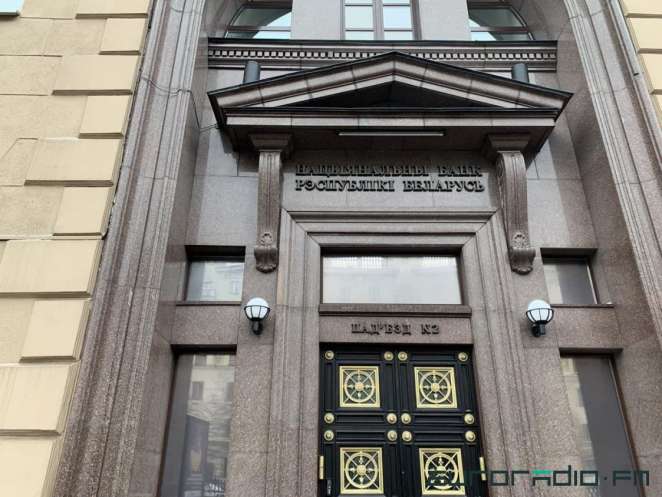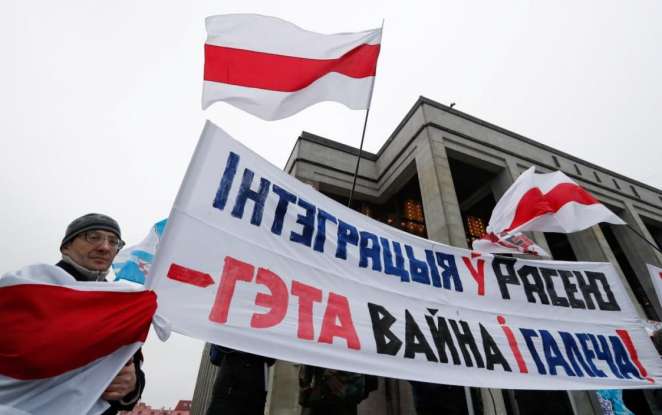Quiet expansionism or playing for time: pundits on 28 Union State programs
Euroradio
20 September 2021, 12:12
 After the September 9 Lukashenka – Putin meeting, we learned more about the 28 Union State programs approved by the Union State Council of Ministers. There is nothing in these programs referring either to political integration or military cooperation.
After the September 9 Lukashenka – Putin meeting, we learned more about the 28 Union State programs approved by the Union State Council of Ministers. There is nothing in these programs referring either to political integration or military cooperation.
Experts have divided opinions on the results of the meeting. Some reckon that the deadlines for roadmaps implementation are deliberately prolonged. Some believe political integration is looming, with Lukashenka trying to steer away from it. Euroradio has collected the most exciting commentaries.
In the view of analyst Siarhei Chaly, the approved programs do not look like a feather in either Putin’s or Lukashenka’s cap when it comes to the economic element.
"The deadlines are pushed even farther away. And, most importantly, there’s no monitoring tool to control the execution of the assumed obligations. All of them [programs] are somewhat muddled."
The analyst emphasizes that Lukashenka didn’t get any new money even with these newly approved programs.
"They agreed on $640 million - a mocking amount, not even a billion. It was evident that Putin [following the meet] had to make a statement of some kind, and Lukashenka had to gain something. At this point, they both failed."
Military expert Yahor Lebiadok sees the approval of the programs as Lukashenka’s surrender, if only in part, to Moscow.
"This is not a 100% victory but rather a very tight schedule with 2024 as a target date. It is worth remembering that a single natural gas market is expected by December 2023, at the earliest, and all programs are incremental. Besides, the funding allocated to Belarus is pretty shoddy."
The expert makes a point that Minsk should not expect any hefty loans from Moscow. More than that, Kremlin will send any money only depending on the implementation of the approved roadmaps.
"It doesn’t mean that every paper signed will become a reality. But, in contrast to the previous programs and the Union State development events, now there is a condition to the economic and political support. Namely, you meet your end of a bargain, and you get some goodies."
Additionally, considering the Russian military foothold in Belarus, it looks like a de facto capitulation. A relatively quick one, at that.
Lebiadok recounts Kommersant’s article from 2019. The contents were very much the same as the declared outcomes of the Lukashenka-Putin meet on September 9. The report also claimed that a confederal economic union would be created. For Belarus, it’s a risk of losing its independence.
"This is the scariest part of the economic integration," points out the expert. "If these roadmaps start functioning in 2024 and a confederation becomes a reality, then the next logical step would be political after economic integration."
One of the pending issues is adopting a single currency.
"The only thing, technically, stopping the development of the single issuing bank is the Constitution of Belarus. It says that the only financial institution authorized to do these kinds of things is the National Bank. There is a catch, though, or two. First: Constitution can be amended by the Parliament. You won’t even need a referendum," continues Yiahor Lebiadok.
Secondly, Belarus and Russia signed the agreement for a single currency back in 2002.
"We were supposed to have the Russian ruble as a transitional currency, starting in 2005. The National Banks of Belarus and Russia developed a joint plan for a single currency transition. We didn’t even have to change the Constitution because the plan stated that the National Banks keep their dominions and issuing banking rights. It means that we can get a single currency without twisting and turning and overhauling the Constitution."
Political analyst Ekaterina Glod, who contributes to the Center for European Policy Analysis, notes that Lukashenka has touched home with politics out of the three areas - politics, military cooperation, and economics.
"The roadmap that used to be called the 31st, which talked about a single currency and a supranational body, is void today. Nevertheless, we can see that the Kremlin is making a considerably thought-out strategic play. At the moment, they decided to channel all of their efforts into the defense and economics."
It was the defense sector that achieved strong results, stresses the analyst.
{banner_news_end}
"Defense was not in any of the 28 roadmaps because the previous version was in the 31st roadmap. We can see that, essentially, a military training center was set up in Belarus. Many people see it as a foundation for the Russian military base."
It is a sign that Lukashenka has to make concessions, Ekaterina Glod is convinced.
“The last thing most talked about was economics. Money matters to Belarus. And money is what we didn’t get, not within the desired scope. Putin made a statement about Belarus getting $640 million. We need at least $3 billion a year to avoid financial meltdown under commitments made to Russia, though.”
The analyst believes that the approval of the programs is collateral, ensuring support for Lukashenka. Things are on a course for integration more profound, however.
“Political integration” as a concept was not explicitly mentioned but implied. And Lukashenka understands that very well. The roadmaps negotiated already exist within the Eurasian Economic Union. Any ordinary citizen would immediately start wondering: Why would we need the same thing in the context of the Union State?
Seeing as Lukashenka failed in getting economic support, it is worth recalling a “Medvedev ultimatum,” says Glod.
“At the end of 2018, Medvedev said: political integration before any talks of economic support. Up to this point, Lukashenka has managed to avoid political integration, but he also didn’t get the money that Belarus has been insisting on reaching for the last three years. I’m talking about the loans, as well as the tax maneuver,” concludes the analyst.
20 September 2021, 12:12

Lukashenka and Putin at the meeting on September 9, 2021 / Reuters
Experts have divided opinions on the results of the meeting. Some reckon that the deadlines for roadmaps implementation are deliberately prolonged. Some believe political integration is looming, with Lukashenka trying to steer away from it. Euroradio has collected the most exciting commentaries.
Chaly: “This is not a feather in either Putin’s or Lukashenka’s cap”
In the view of analyst Siarhei Chaly, the approved programs do not look like a feather in either Putin’s or Lukashenka’s cap when it comes to the economic element.
Putin announced a relatively small loan for Belarus / Reuters
"The deadlines are pushed even farther away. And, most importantly, there’s no monitoring tool to control the execution of the assumed obligations. All of them [programs] are somewhat muddled."
The analyst emphasizes that Lukashenka didn’t get any new money even with these newly approved programs.
"They agreed on $640 million - a mocking amount, not even a billion. It was evident that Putin [following the meet] had to make a statement of some kind, and Lukashenka had to gain something. At this point, they both failed."
Lebiadok: “Economic integration will trigger a political one."
Military expert Yahor Lebiadok sees the approval of the programs as Lukashenka’s surrender, if only in part, to Moscow.
"This is not a 100% victory but rather a very tight schedule with 2024 as a target date. It is worth remembering that a single natural gas market is expected by December 2023, at the earliest, and all programs are incremental. Besides, the funding allocated to Belarus is pretty shoddy."
The expert makes a point that Minsk should not expect any hefty loans from Moscow. More than that, Kremlin will send any money only depending on the implementation of the approved roadmaps.
"It doesn’t mean that every paper signed will become a reality. But, in contrast to the previous programs and the Union State development events, now there is a condition to the economic and political support. Namely, you meet your end of a bargain, and you get some goodies."
Additionally, considering the Russian military foothold in Belarus, it looks like a de facto capitulation. A relatively quick one, at that.
Zapad-2021 military drills in the Brest region / Reuters
Lebiadok recounts Kommersant’s article from 2019. The contents were very much the same as the declared outcomes of the Lukashenka-Putin meet on September 9. The report also claimed that a confederal economic union would be created. For Belarus, it’s a risk of losing its independence.
"This is the scariest part of the economic integration," points out the expert. "If these roadmaps start functioning in 2024 and a confederation becomes a reality, then the next logical step would be political after economic integration."
A single currency is not an issue
One of the pending issues is adopting a single currency.
"The only thing, technically, stopping the development of the single issuing bank is the Constitution of Belarus. It says that the only financial institution authorized to do these kinds of things is the National Bank. There is a catch, though, or two. First: Constitution can be amended by the Parliament. You won’t even need a referendum," continues Yiahor Lebiadok.
Secondly, Belarus and Russia signed the agreement for a single currency back in 2002.
National Bank of Belarus / Euroradio
"We were supposed to have the Russian ruble as a transitional currency, starting in 2005. The National Banks of Belarus and Russia developed a joint plan for a single currency transition. We didn’t even have to change the Constitution because the plan stated that the National Banks keep their dominions and issuing banking rights. It means that we can get a single currency without twisting and turning and overhauling the Constitution."
“Nobody mentioned “political integration,” but it was implied.”
Political analyst Ekaterina Glod, who contributes to the Center for European Policy Analysis, notes that Lukashenka has touched home with politics out of the three areas - politics, military cooperation, and economics.
"The roadmap that used to be called the 31st, which talked about a single currency and a supranational body, is void today. Nevertheless, we can see that the Kremlin is making a considerably thought-out strategic play. At the moment, they decided to channel all of their efforts into the defense and economics."
It was the defense sector that achieved strong results, stresses the analyst.
{banner_news_end}
"Defense was not in any of the 28 roadmaps because the previous version was in the 31st roadmap. We can see that, essentially, a military training center was set up in Belarus. Many people see it as a foundation for the Russian military base."
It is a sign that Lukashenka has to make concessions, Ekaterina Glod is convinced.
“The last thing most talked about was economics. Money matters to Belarus. And money is what we didn’t get, not within the desired scope. Putin made a statement about Belarus getting $640 million. We need at least $3 billion a year to avoid financial meltdown under commitments made to Russia, though.”
The analyst believes that the approval of the programs is collateral, ensuring support for Lukashenka. Things are on a course for integration more profound, however.
Protests in Minsk against integration with Russia in 2019 / Reuters
“Political integration” as a concept was not explicitly mentioned but implied. And Lukashenka understands that very well. The roadmaps negotiated already exist within the Eurasian Economic Union. Any ordinary citizen would immediately start wondering: Why would we need the same thing in the context of the Union State?
Seeing as Lukashenka failed in getting economic support, it is worth recalling a “Medvedev ultimatum,” says Glod.
“At the end of 2018, Medvedev said: political integration before any talks of economic support. Up to this point, Lukashenka has managed to avoid political integration, but he also didn’t get the money that Belarus has been insisting on reaching for the last three years. I’m talking about the loans, as well as the tax maneuver,” concludes the analyst.





